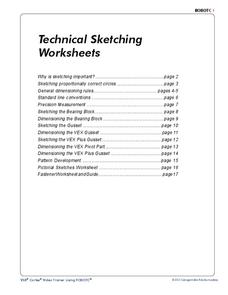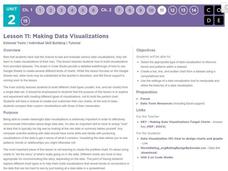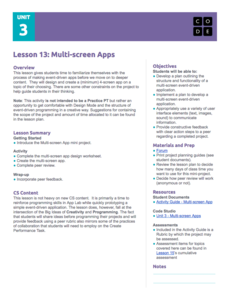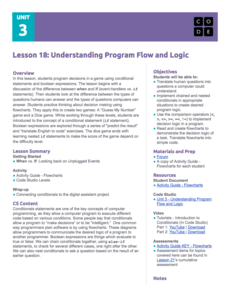Teach Engineering
Future Flights: Imagine Your Own Flying Machines!
What will flying look like in the future? The 21st lesson plan in a 22-part unit on aviation reviews the major aspects of the lesson plan. Pupils brainstorm ideas of a future flying machine.
Curated OER
Math On the Job
Investigate different types of math required for specific jobs. In this math in occupations lesson, use the Internet to research what type of math one might need to know in order to be successful in different jobs. Complete a related...
Institute of Electrical and Electronics Engineers
Radio Reception and Transmission
After reading about radio transmission, application, and the difference between AM and FM, small teams of engineers use a kit to construct an FM radio and then send and receive broadcasts. This is an ideal activity for middle school STEM...
Carnegie Mellon University
Technical Sketching Worksheets
How do you create a technical drawing? Cover the basics of technical sketching with a few practice sketches of simple shapes. A technical sketching lesson introduces the proper precision measurement techniques. Pupils progress to draw...
Kenan Fellows
Letter Writing to Politicians on Environmental Issues
Let your voices be heard! Pupils research local and national environmental concerns using the Internet. Class members determine an issue they deem important and draft a letter to a local politician expressing their concern about the...
Code.org
Binary Numbers
All you need is a zero and a one. Build pupils' understanding of binary values and number systems to gain familiarity with binary numbers. Using a hands-on activity and technology, scholars learn how the binary system works and its place...
Code.org
Good and Bad Data Visualizations
Good versus bad data. Pairs rate online collections of data representations from good to bad and then suggest ways to improve the visualizations. The class then creates a list of best practices and common errors in data representations...
Code.org
Discover a Data Story
"Data is so boring, there's no way to find any patterns in them." Or is there? Pairs investigate data sets using different data visualization tools to discover a trend that may exist in a data set. Once they find a trend or pattern,...
Code.org
Making Data Visualizations
Relax ... now visualize the data. Introduce pupils to creating charts from a single data set. Using chart tools included in spreadsheet programs class members create data visualizations that display data. The activity encourages...
Teach Engineering
A Simple Solution for the Circus
Class members are challenged to design a device that will move a circus elephant into a train car. Groups brainstorm ideas that use simple machines to load the elephant. They then choose one of their ideas, sketch a plan, and present it...
Teach Engineering
Viscous Fluids
Elasticity and viscosity. Help your class understand the similarities and differences with an introduction to viscous fluids. After describing four types of fluid behaviors: shear thinning, shear thickening, Bringham plastic, and...
Teach Engineering
Abdominal Cavity and Laparoscopic Surgery
Get to know the human body from the inside out. The first lesson plan in a series of 10 introduces the class to the abdominopelvic cavity. Biomedical engineers need to understand the region of the body as they develop and improve...
Code.org
Multi-screen Apps
Scholars continue their study of event-driven programming by creating a multi-screen app in the fifth lesson of the series. They incorporate previously learned elements and events in the mini-project.
Code.org
Understanding Program Flow and Logic
Explore decision-making logic in programming computer games. The 10th installment of a 21-part unit teaches scholars how to apply conditional statements and Boolean expressions. They use these concepts to create a "Guess My Number" game...
Teach Engineering
Connect the Dots: Isometric Drawing and Coded Plans
Individuals discover how to draw cubes on triangle-dot paper. They use cubes to build structures and draw corresponding isometric drawings on dot paper in the second lesson of the series of five. The activity also introduces the concept...
Teach Engineering
Seeing All Sides: Orthographic Drawing
How can your draw three-dimensional figures on paper? The lesson shows pupils how to draw orthographic projections of three-dimensional figures composed of cubes. After viewing a PowerPoint presentation, they practice this skill with...
Teach Engineering
Let's Take a Spin: One-Axis Rotation
Investigate the effect of one-axis rotations on geometric figures. Scholars learn to use snap cubes and the right-hand rule to draw figures after rotations about the x-, y-, or z-axes. They try their hands at examples created by the...
Teach Engineering
New Perspectives: Two-Axis Rotation
Two-axis rotations ... twice the fun as one-axis rotations! The last installment of a five-part module teaches scholars how to conduct two-axis rotations. They create isometric drawings before and after the rotations.
DiscoverE
Laser Challenge
Help your class become laser focused on the connection between sound and light. Scholars set up mirrors to bend and direct lasers that are connected to a music source. Music should start playing when the laser hits the photoresistor.
DiscoverE
Design a Catapult
Just this once, it's okay to throw things in class. Out of craft sticks and rubber bands, pupils build catapults to launch an object of choice. This can be a ping-pong ball, a marshmallow, or any other small item. As long as it hits the...
DiscoverE
Tunnel Meetup
Meet me in the tunnels. Scholars choose a tunnel entrance and mark it on their side of the cardboard. They describe the location to their partners and see if they can guess each other's locations. Punching a hole through the cardboard...
Teach Engineering
Energy Intelligence Agency
Protect the world from energy depletion—join the Energy Intelligence Agency. Using a set of cards, pupils distinguish between correct and incorrect information regarding energy use in the United States. They analyze graphs and diagrams...
Kenan Fellows
Evaluating Sensors and the Impacts of Physiological Stress: Designing a Wearable Device for Rescue Workers
A long-term project has scholars consider ways in which sensors help monitor physiological stress levels of rescue workers. They design and create a portable device for this purpose. Techies to the rescue!
Facing History and Ourselves
Compass Points
Needs, Suggestions, Excitement, and Worries. A Compass Points worksheet asks pupils to give feedback on that day's lesson. Learners identify what they need from the instructor and classmates, what excites them about the class, what...

























